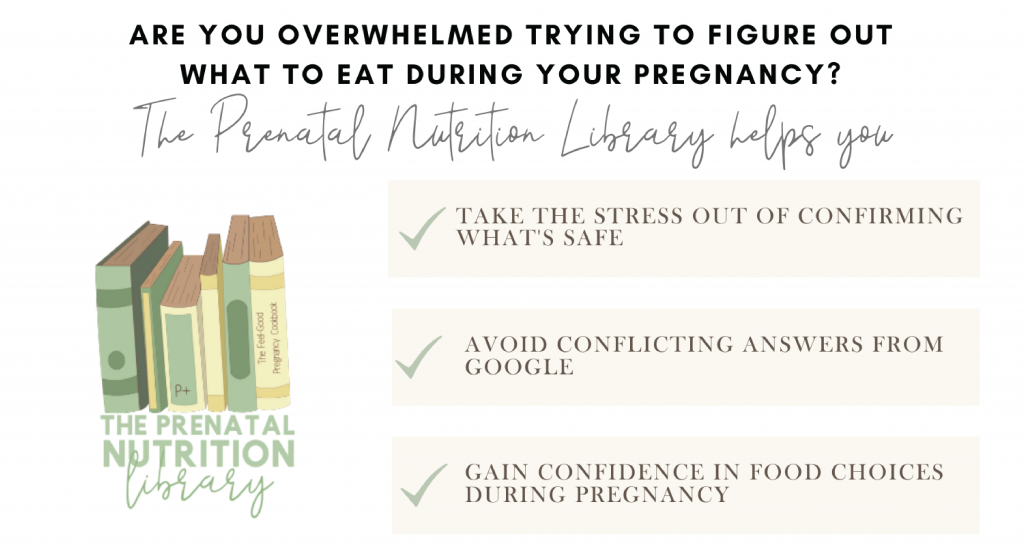How to choose and what to look for in a prenatal vitamin
First, I want to start by saying, it is very hard to make a blanket recommendation when it comes to taking prenatal vitamins because everyone is starting at a different place nutritionally, follows various diets, and may eliminate certain food groups due to allergies or health preferences.
I believe in a food first approach to nutrition, which means we should ideally get our nutrients from food. However, there are times when it is wise to supplement your diet such as pregnancy.
Who should take a prenatal vitamin?
Anyone who is planning a pregnancy is currently pregnant or is breastfeeding should start taking prenatal vitamins. The vitamins you are taking may need to change during each of these stages.
Why do we take prenatal vitamins?
I recommend taking them when you are planning to conceive because it is best to avoid any nutrient deficiencies going into pregnancy and to increase your storage of certain vitamins/minerals. It is best that we reach optimal nutrition during our preconception time.
Secondly, this is not a time when we want to guess or assume that we are meeting all of our nutrient needs just because we are eating foods from all the food groups and follow a generally healthy diet. Third, our needs for many key nutrients increase during pregnancy.
Next, there is a lot of research that suggests a decrease in unwanted pregnancy complications with prenatal vitamin use. Last, a lot of the nutrient recommendations during pregnancy are best guesses and not actually based on clinical trials in pregnant women.
How should prenatal vitamins be used?
Just like any other supplement, they should be used as a SUPPLEMENT to a healthy diet. Prenatal vitamins do not contain all of the nutrients mom and baby need. So it is absolutely essential that we still do our best to eat a healthy diet.
How do we know which brands to trust
Unfortunately, like all other supplements on the market, there is very little oversight by the FDA. Make sure the supplement you chose has been tested by a third party such as Consumer Lab or NSF.
Basically, do your research, read reviews, talk to your doctor, and know what you are taking when choosing a prenatal vitamin.
What should we look for in a prenatal vitamin?
This is a loaded question. As I stated earlier, this can and will be different for everyone, but I do want to note several basic things to look for.
- A lot of prenatal vitamins do not contain enough or do not at all contain iodine, choline, vitamin K2, selenium, vitamin D, vitamin B12, and magnesium. Look to make sure your vitamin includes these.
- It is ideal to find a vitamin with activated B vitamins, for example, instead of folate or folic acid, it should read L-methylfolate and instead of Vitamin B12, it should read methylcobalamin. The activated forms of vitamins are absorbed better.
- Choose Vitamin D3 over Vitamin D2 because it is more effective at raising and maintaining Vitamin D levels in our bodies.
- It should contain at least a portion of retinyl palmitate, which is preformed Vitamin A.
- Calcium and iron compete for absorption. The best way to avoid this may be to take iron separate from your other prenatal vitamin. Some supplements contain one or the other for this reason.
- DHA needs to be fish oil or algae-based NOT from flaxseed oil. Flaxseed oil is a source of ALA which is converted to DHA, but the conversion rate is not good, so it is likely you won’t get enough DHA to meet the recommendations. You can get enough DHA from diet alone if you eat fatty fish 2-3 times per week!
- Take your supplement with meals for better absorption and prevention of nausea. Take your pills or gummies throughout the day because we can only absorb so many nutrients at one time.










Do you have a vitamin you recommend?
Hi there! Thanks for reading my post. As stated in the post, everyone has different supplement needs, however, I often find myself recommending SmartyPants, Thorne, and Seeking Health. If you would like more specific guidance, please schedule a call!
What do you think about the Megafoods baby and me 2 prenatal?
Hi, Anna! I’d have to take a closer look, but at first glance, it looks like it’s missing choline.
Hello ryann! Loved your post very informative, so happy I found you! What is your opinion on Garden of life Vitamin Code Raw Prenatal?
Hi, Sasha, check out my IGTV review on Instagram here: https://www.instagram.com/tv/B1xLVr_Frjc/